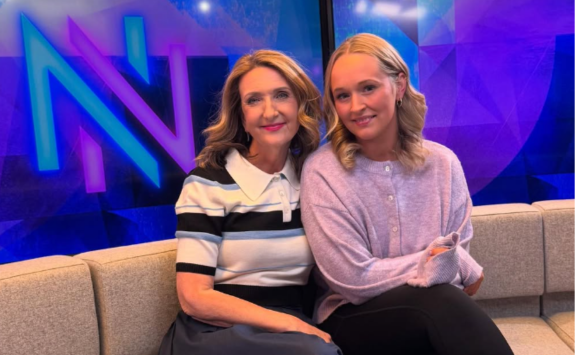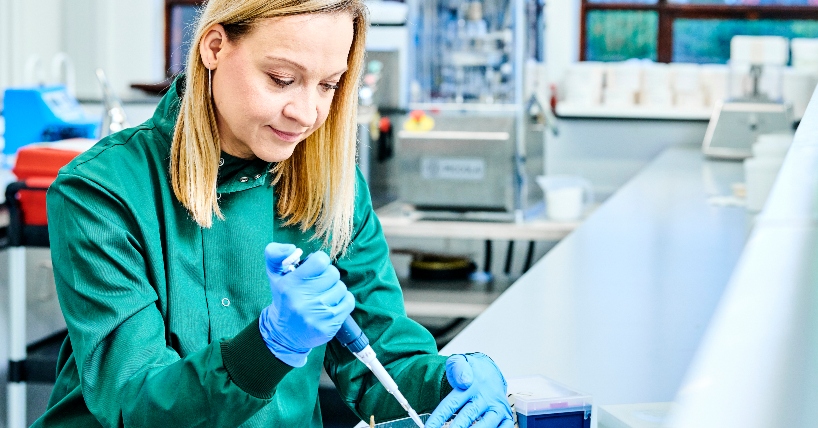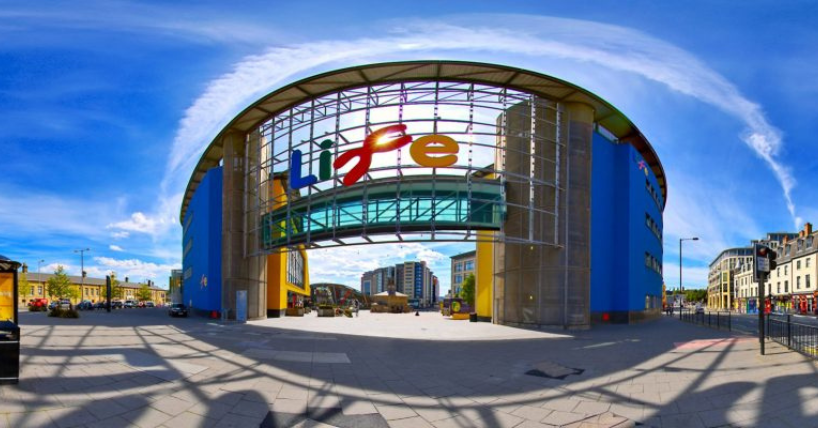“If you survive, it’s too late”: One graduate’s battle to become a parent post-cancer
Having overcome stage four cancer, 26-year-old graduate Mollie Mulheron (BA Modern Languages, 2020; PGCE, 2022) was looking forward to living her life and planning for the future. But fertility policies that exclude cancer survivors have put her plans for parenthood on pause, and she is now campaigning to make the system fairer.
1 September 2025
Originally from Skipton in North Yorkshire, Mollie arrived at Newcastle University in 2016 to study Spanish and German, before progressing to complete her teaching qualification. After graduating, she headed out to the Galapagos Islands to teach English, but soon began feeling unwell. Her symptoms were brushed off by the doctors she visited on the island, but when Mollie returned to the UK to visit family, she collapsed in a supermarket within 12 hours of landing.
Now two years in remission from stage four cancer, Mollie is facing an uphill battle to realise her dream of becoming a parent. She has spent the past six months raising awareness of the barriers cancer survivors face in accessing fertility treatment, including an interview with Victoria Derbyshire on BBC’s Newsnight, and having the topic raised with the Secretary of State for Health and Social Care, Wes Streeting MP.
.png)
Ahead of World Lymphoma Awareness Day on 15 September, we spoke with Mollie to find out more about what needs to change to allow cancer survivors the opportunity to have a child.
My life turned upside down
When I was diagnosed with stage 4 diffuse large B-cell lymphoma, the most common type of aggressive blood cancer, at the age of 24, my life turned upside down.
I completed my PGCE at Newcastle University in 2022 and then moved to the Galápagos Islands, teaching English and fulfilling a long-held dream. After years of struggling with anxiety, I had finally found my peace on the islands. I was thriving. Life felt full of possibility.
But on a short visit back to the UK to see my family, I collapsed just after stepping off the plane. I was rushed to hospital, where they found a melon-sized tumour engulfing my heart. I was told I had stage 4 blood cancer: it couldn't have been any more advanced. I had been to the island doctors multiple times with symptoms and chest pain, just to be told it was in my head. Listen to your body. You know it best!
Within days, I went from healthy and full of plans to lying in a hospital bed with a diagnosis that shattered everything. Thankfully, they were able to put me on steroids to halt the tumour and stop it engulfing my heart and killing me, but if I hadn't been in England when I collapsed, I likely would have died.
I was no longer the adventurous young woman chasing her future — I was a cancer patient fighting to survive.
Fertility fog
From the beginning, everything moved fast. My cancer was aggressive and advanced. Treatment needed to begin within days. I asked about fertility preservation and was told it wasn’t possible before chemotherapy due to how urgent and life-threatening my condition was. At the time, that was devastating—but I understood. I needed to survive.
However, I was also told something else—something that gave me hope. I was reassured that once I completed treatment and was in remission, I could pursue egg freezing then. There was no suggestion that funding would be a barrier or that I'd lose the opportunity entirely.
So, I held onto that idea. I believed that if I could just get through treatment, I’d have the chance to protect my fertility afterwards.
Fast forward two years, and I’m in remission. I returned to teaching after treatment, but ongoing immune system damage meant I eventually had to resign. It was a heartbreaking decision, but I’ve redirected that energy into something positive. I have recently opened a language academy for children and wrote a book to support young people facing cancer. I’m moving forward, but still holding on tightly to the dream of becoming a mother one day.
I was reassured that once I was in remission, I could pursue egg freezing. There was no suggestion that funding would be a barrier, or that I'd lose the opportunity entirely.
So I followed up on what I’d been told. I had my hormone levels checked, and the results showed I was still eligible. I was referred to a fertility clinic. I thought this was the moment I’d finally regain some control over my future.
Then the rejection came.
A system that leaves survivors behind
My referral for egg freezing was declined. I was told that because I had already completed cancer treatment, I was not eligible for NHS-funded fertility preservation. The fact that I’d been too ill to freeze my eggs beforehand—and had been promised the chance afterwards—didn’t matter. The criteria, I was told, are rigid: funding is only available pre-treatment. If you survive, it’s too late.
It was like being hit by a second wave of grief. I had done everything right. I had asked the questions. I had followed the advice. I had trusted the system.
Yet here I was, being told: you survived, but you’re no longer a priority.
The injustice of it all was almost harder to process than the original diagnosis. I hadn’t chosen to delay egg freezing. It had been taken out of my hands. I was promised a chance later, and then denied it.
.png)
.png)
When I was finally seen by fertility specialists, they were supportive and clear: egg freezing was something I urgently needed to consider. They told me that, due to the nature of the chemotherapy I’d had, my ovarian reserve was likely to decline rapidly, and time was not on my side. If I didn’t freeze my eggs soon, I might lose the chance altogether.
One consultant even said that if preservation wasn’t possible, I’d need to start thinking seriously about having children by the age of 30—just a few years from now. That was a shocking thing to hear. I’m still building my life after cancer—still processing everything I’ve been through—and suddenly there’s this enormous pressure hanging over me.
It feels so unfair to be told you must rush into motherhood, not because you’re ready, but because your biology has been pushed into crisis by an illness you never chose. I had one of the most intense chemo regimes known to man. Almost 800 hours. The fact that my body and egg reserve were ok for now and I could still egg freeze was a medical miracle in itself.
The fertility doctors appealed multiple times, but to no avail. The system had failed me, and I quickly realised I wasn’t alone.
It feels so unfair to be told you must rush into motherhood, not because you’re ready, but because your biology has been pushed into crisis by an illness you never chose.
No safety net
I began speaking to other young cancer survivors and researching what guidelines actually exist. What I found is that post-treatment fertility preservation is a confusing and inconsistent grey area.
Some survivors are offered it. Others are rejected outright. Some NHS trusts will fund it on compassionate grounds. Others follow strict cut-off policies. It often depends on where you live, who you speak to, and how much you push.
That’s not how healthcare should work.
What’s worse is that many cancer patients are being given false reassurance—just like I was—that they can "sort it out after treatment" when, in reality, no clear or consistent funding pathways exist.
This grey area leaves thousands of young people vulnerable to crushing disappointment, emotional distress, and a lost chance at parenthood. It’s a loophole, and it’s costing people their futures.
Why fertility matters
Let me be absolutely clear: fertility is not a luxury.
For many of us, it's a core part of our identity and our future. It’s deeply personal. The trauma of cancer is not just in what it takes from your body—it’s in what it quietly steals from your life plans, your relationships, your sense of womanhood or manhood, your ability to choose.
And when we survive, we want to live fully, not with limits.
As survival rates continue to improve, we must shift our focus toward life after cancer, not just life during it.
What I’m fighting for
Since my experience with the fertility clinic, I’ve started campaigning to close this gap in care and ensure that all cancer survivors—regardless of treatment timing—have equal access to NHS-funded fertility preservation.
My campaign calls for:
- Clear and compassionate NHS policy that recognises the many individual circumstances cancer survivors face. Fertility preservation should be funded as essential care, not governed by a one-size-fits-all rule.
- Standardised access across the UK, so that a survivor’s postcode does not determine their future or their ability to have children.
- Recognition that post-cancer fertility preservation is essential care, not an optional extra.
This is about justice. It’s about restoring choices to people who’ve already lost so much. And it’s about creating a healthcare system that doesn’t just save lives, but supports them.

I’ve been in contact with the BBC and other major news outlets to raise awareness of this urgent issue. My local MP has also taken up the cause and secured a meeting with Wes Streeting, one of the most powerful figures in UK healthcare. With this momentum building, I’m hopeful that real change is within reach.
We’re not asking for special treatment—we’re asking for fairness. We didn’t survive cancer to be told that our futures don’t matter.
As survival rates continue to improve, we must shift our focus toward life after cancer, not just life during it.
To my fellow alumni
Newcastle University gave me the foundation for all I’ve achieved since. It taught me to see beyond borders, to care about people and the world, and to never stay silent in the face of injustice.
If this story moved you, please help amplify it. Whether through support, action, or being part of the conversation, if you or someone you know has had a similar experience, you can make a difference.
Together, we can ensure that cancer survivors are given not just life, but the chance to live it fully.


